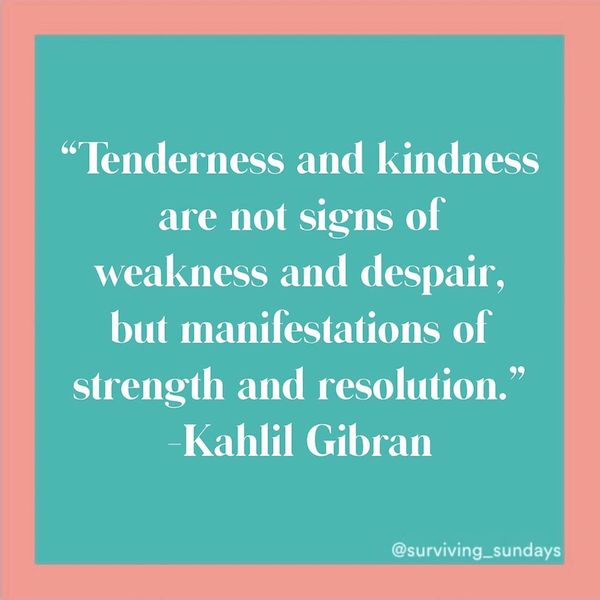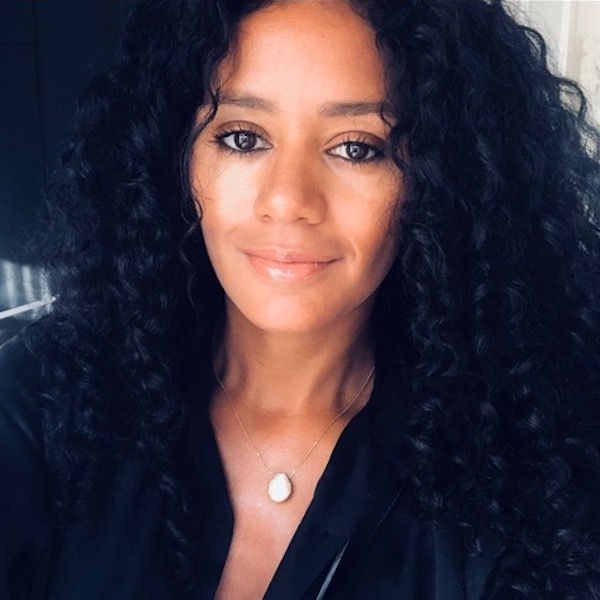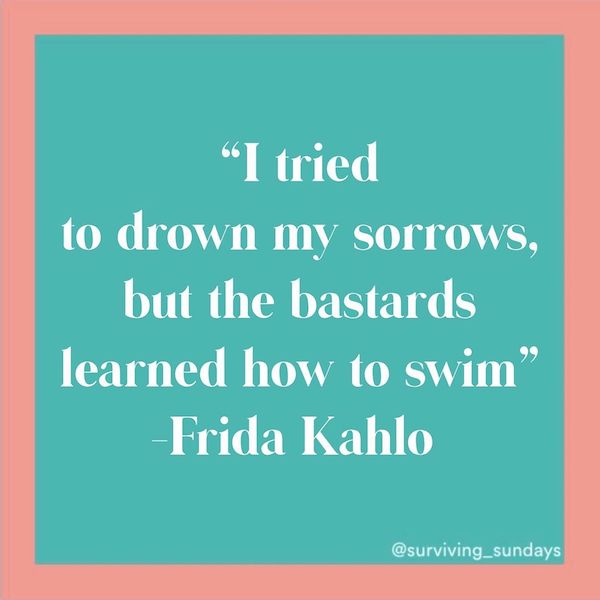Surviving Sundays’ Emma Mainoo: ‘What I’ve Learnt From Blogging About Mental Health’

According to Mind, approximately one in four people in the UK will experience a mental health problem each year, while one in six people experience a common mental health problem, such as anxiety and depression, in any given week. It’s highly likely then that someone you know will have experienced a mental health issue in one form or another.
Mental Health Awareness Week runs from 18-24 May this year, drawing widespread attention to the epidemic. A firm fixture on the UK calendar since 2001, the event has made great strides and mental health no longer carries the stigma it once did. But it’s still hard for many who suffer from mental health issues to open up.
This is partly why Emma Mainoo set up blog and podcast, Surviving Sundays. Mainoo, who became a qualified Mental Health First Aid instructor last year and works with corporate businesses to help create happier workplace cultures, uses the storytelling platform to share a range of personal essays from people suffering mentally in one way or another.
From dealing with the menopause and the mental weight of chronic pain to struggling with family estrangement or debilitating OCD, Surviving Sundays is a vital resource, not least for its frank relatability. After all, one of the goals of Mental Health Awareness Week is to make people realise they’re not alone, and in these stories of recovery, a well-trodden path is shown. We spoke to Mainoo about what she has learned in her mental health journey, as well as some tips for those suffering on their own.
-
How Did Your Mental Health Journey Come About?
I had been working in marketing and entertainment for several years before I had my breakdown in 2012. From the outside, it looked like I was thriving, both professionally and personally, and actually, I wasn’t. I’d just been running away from my mental health problems for many years.
I didn’t tell anybody in 2012 what happened to me. I just kept on working, wearing the masks that we all wear, hiding behind work, and looking like a social butterfly. I was doing therapy and getting well, but it wasn’t until two years ago that I told my story. And through telling that story, a lot of doors opened for me. A lot of companies who’d known me as a leader in the marketing industry said, “Would you come in and tell your story? Or would you be on a panel?” And then I did a course and trained to become a teacher, and I now teach a two-day government-endorsed course on mental health.
-
Why Did You Decide To Open Up?
When I had my breakdown, it was the most debilitating thing. I wasn’t able to work. I wasn’t able to leave my room. I wasn’t able to meet my basic needs and getting to the shower was an effort.
This breakdown came before I was about to move to America with an ex-partner and it didn’t happen. A lot of people had actually thought I’d gone; I was invisible. The people closest to me knew how bad things were though. I was just going to therapy and trying to get well.
The decision to kind of be more open about my experience was a leap because I was freelance when I decided to come out and tell my story. I didn’t have the security of a company to take care of me and there was a risk that people might not hire me. I was single, so I was worried that I wouldn’t date as well.
The thing that really persuaded me was the fact that when I had all these mental health problems, I felt so alone and ashamed. But, my therapist would say things to me like, ‘Emma you’re a walking miracle after everything you’ve been through,’ and that gave me this quiet confidence.
When I went to the pub, people when they got a bit drunk, would reveal themselves and I would see that people had problems too, but they weren’t talking about it. I had a really good private health care policy with my company, and I wasn’t taking the mental health help available to me because I was frightened that HR would find out. And I just thought this has got to change.
-
A lot Of People At The Beginning Feel Very Alone. That’s How It Kicks Off, Invariably, Do You Not Think?
Yeah and that’s why I use the hashtag ‘#YouAreNotAlone’ on our social media posts. Only I could go to therapy. No one else could do that for me. Even with people around me that love me, I had to do it on my own. And I didn’t have to feel alone and ashamed. I didn’t have to feel like, “Oh my God. I’m so weird for all these feelings that I have.”
Everywhere I looked, I just couldn’t find anybody that I connected with that was going through my experience. So I wanted to create this place where people could talk about whatever their issue was. It didn’t need to be like, “I’ve had depression for years.” It could be, “Somebody has just left me and I’m heartbroken,” or it could be, “Somebody died, and this is how I recovered from grief,” or somebody has got an alcohol problem. I wanted it to reflect the real spectrum.
From Surviving Sundays, I get messages from people who say things like, “Thank you. Your stories are helping me to feel less alone and weird. You’re helping me to feel more normal.” And it’s not just my story. I share stories anybody can write. And it was important to me to share the stories of men because I appreciate that my aesthetic might be a bit feminine. My voice is obviously female. And it really helped when men write because other men feel seen.
-
Where Did The Name Surviving Sundays Come From?
I often spent my weekends alone because I felt like I didn’t have the energy to see friends and fake it. And on a Monday morning in the office, people would always come up to you and say, “How was your weekend?” And I’d be making a cup of tea, just thinking, “Oh, my God. They had fun with their friends or their boyfriends, and I was so alone.”
Sundays filled me with dread just thinking about the lies that I would be living throughout the week. As part of my healing I basically just learned to treat Sunday as something that was a day of rituals. That started with a 20-minute walk, which soon became two hours. I felt house-bound when I was depressed. And so now, Sunday has gone from being my most feared day of the week to my most loved and protected. For me, that connection is really important. It shows you the journey of hope and recovery, and that recovery is possible.
-
Do You Think Running Surviving Sundays Has Helped Your Mental Health?
Yeah, I do. I think one of the reasons that I wanted to tell my story was that I wanted to be seen. I was sick of hiding. On the journey to creating Surviving Sundays I didn’t just write a story one day and post it the next. I worked on it and really thought about the messages.
I was quite nervous the night before I launched it but it felt like a liberation. Here I am. If you’re going to employ me, if you’re going to be my friend, if you ever want to date me, then this isn’t something you’re going to find out down the line. It’s here. And I don’t want to hide anymore.
Emma’s Tips For Looking After Your Mental Health
Be Conscious Of What You’re Putting In Your Body
What are you putting in it to support you? Are you drinking every night and eating comfort food that’s not really nourishing you? I think there’s room to allow yourself those things, but look at the healthy foods that go into you.
We’re all becoming a lot more health conscious, and its easier to do things like socialise and not drink these days. I used to binge drink at times and I had gone through a couple of years of drinking to take the edge off, before I went on a 90-day ‘no alcohol’ challenge. Now, if I commit to a challenge, I really will commit to it. Then after the 90 days, so many positive life changes had come from it that I just kept going. It’s been 16 months now but I don’t really count the days anymore.
Don’t Think It Will Just Go Away
If you’re thinking you might have a mental health problem, you probably do. It’s not a thought that’s just going to cross your mind for no reason. What I will say from experience is that if you just keep going, and you keep giving to everybody else, without taking care of that little inner voice that’s saying to you, “I’m not well, I need help,” then it will show up. That could be mentally, you might start to become irritable, or it might be fatigue, sleepless nights, skin breakouts or a loss of appetite. It’s because your mind is screaming at you and you’re not listening.
Stop Comparing Yourself To Others
At the moment I think there’s a lot of comparison going on. “That person got dressed today, and look at her outfit or that person is working out loads and he’s going to have a great body at the end of this.” That’s just another layer of shame and pain on top of everything you’re already going through if you’re finding it hard to get motivated. Just accept that our bodies and our minds are doing brilliant jobs at keeping us alive and well at the moment. If the cost of that might be having less energy than you’d hope, than you just need to just take things a bit more slowly.
Don’t Give Up On Therapy
It’s very rare that you’re going to walk into therapy, have one session, and walk out of it going, “Oh, wow. I’m fixed.” On the other side of that, rather than saying therapy doesn’t work, then maybe the therapist isn’t right for you and you need to try again. When I started I’d say things like, “I can’t afford it,” or, “I’m tired”. And really they were just excuses because I didn’t want to spend an hour facing difficult stuff. But it was only through doing that, that I got better.
I don’t want to just throw therapy out there as the fix-it for everybody because there are genuine financial implications, but there are lots of different and affordable therapy models around now. Think of it as an investment in yourself. I know some therapy providers that do sessions for £25 and I also know plenty of people who will spend £25 on a round of drinks.
Space Out Your Day
Finding small ways to take care of yourself, can really help before you get to boiling point. Whether it’s feeling uncomfortable feelings and saying, “Right, you know what? I’m going to step away from my laptop or this Zoom call when it’s done.” Start putting lunch breaks in your diary. Take 30 minutes to walk outside, look out of the window or switch off from all devices, and just take a breath.






















